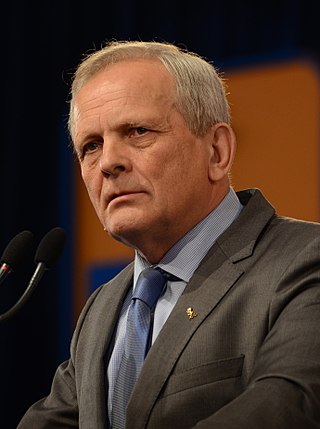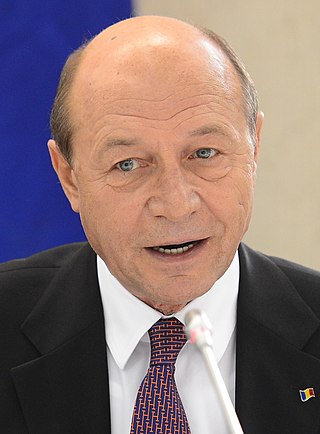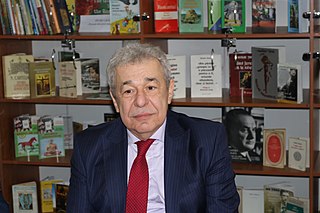
Romania's political framework is a semi-presidential representative democratic republic where the Prime Minister is the head of government while the President, according to the constitution, has a more symbolic role, is responsible for the foreign policy, signs certain decrees, approves laws promulgated by the parliament, and nominates the head of government. Romania has a democratic, multi-party system, with legislative power vested in the government and the two chambers of the Parliament, more specifically the Chamber of Deputies and the Senate. The judiciary is independent of the executive and the legislature. From 1948 until 1989, the communist rule political structure took place in the framework of a one-party socialist republic governed by the Romanian Communist Party (PCR) as its only legal party.
After the Communist rulership ended and the former Communist dictator Nicolae Ceaușescu was executed in the midst of the bloody Romanian Revolution of December 1989, the National Salvation Front (FSN) seized power, led by Ion Iliescu. The FSN transformed itself into a massive political party in short time and overwhelmingly won the general election of May 1990, with Iliescu as president. These first months of 1990 were marked by violent protests and counter-protests, involving most notably the tremendously violent and brutal coal miners of the Jiu Valley which were called by Iliescu himself and the FSN to crush peaceful protesters in the University Square in Bucharest.

Theodor Dumitru Stolojan is a Romanian politician who was Prime Minister of Romania from September 1991 to November 1992. An economist by training, he was also one of the presidents of the National Liberal Party (PNL) before being the founding leader of the Liberal Democratic Party (PLD) and then the Democratic Liberal Party (PDL). He was a Member of the European Parliament for Romania, representing the Democratic Liberal Party (PDL) and then the National Liberal Party. He was also professor at the Transilvania University of Brașov between 2002 and 2012.

Petre Roman is a Romanian engineer and politician who was Prime Minister of Romania from 1989 to 1991, when his government was overthrown by the intervention of the miners led by Miron Cozma in the September 1991 Mineriad. Although regarded as the first Romanian prime minister since 1945 who was not a communist or communist sympathiser, he was a socialist. He later self-identified as a liberal. He was also the president of the Senate from 1996 to 1999 and Minister of Foreign Affairs from 1999 to 2000.

The National Liberal Party is a Christian democratic and socially conservative political party in Romania. Re-founded in mid January 1990, shortly after the Revolution of 1989 which culminated in the fall of communism in Romania, it claims the legacy of the major political party of the same name, active between 1875 and 1947 in the Kingdom of Romania. Based on this historical legacy, it often presents itself as the first formally constituted political party in the country and the oldest of its kind from the family of European liberal parties as well.

Traian Băsescu is a Romanian conservative politician who served as the fifth president of Romania from 2004 to 2014. Prior to his presidency, Băsescu served as Romanian Minister of Transport on multiple occasions between 1991 and 2000, and as Mayor of Bucharest from 2000 to 2004. Additionally, he was elected as leader of the Democratic Party (PD) in 2001.

The Romanian Democratic Convention was an electoral alliance of several democratic, anti-communist, anti-totalitarian, and centre-right political parties in Romania, active from 1991 until 2000. The most prominent leaders of the CDR throughout the 1990s were by far Corneliu Coposu, Ion Rațiu, and Ion Diaconescu, all three members of the Christian Democratic National Peasants' Party (PNȚCD) - successor and political heir to the National Peasants' Party (PNȚ), active in the Kingdom of Romania between 1926 and 1948).

Emil Boc is a Romanian politician who was Prime Minister of Romania from 22 December 2008 until 6 February 2012 and is the current mayor of Cluj-Napoca, the largest city of Transylvania, where he was first elected in July 2004. Boc was also the president of the Democratic Liberal Party (PDL), which proposed and supported him as Prime Minister in late 2008, from December 2004 until July 2012.
Dumitru Gheorghe Mircea Coșea is a Romanian politician, economist, diplomat, essayist, journalist and professor. A former member of the Party of Social Democracy (PDSR) until June 1997, he joined Teodor Meleșcanu and Iosif Boda in creating the short-lived Alliance for Romania party, which merged into the National Liberal Party (PNL) in 2002. In 1999, Coșea was among the members of Varujan Vosganian's grouping, the Union of Right-wing Forces, which also joined the PNL.

Doru-Viorel Ursu was a Romanian politician and lawyer. A member of the National Salvation Front (FSN), he was minister of the interior in the Petre Roman cabinets, carrying his mandate between the Mineriads of 1990 and 1991.

The Democratic Liberal Party was a liberal-conservative political party in Romania. The party was formed on 15 December 2007, when the Democratic Party (PD) merged with the Liberal Democratic Party (PLD). On 17 November 2014 the PDL officially merged into the National Liberal Party (PNL), ceasing to exist. The PDL was associated with Traian Băsescu, who was previously leader of the PD and President of Romania from 2004 to 2014.

The Văcăroiu Cabinet was the 111th cabinet of Romania between 1992 and 1996, led by Nicolae Văcăroiu. After the 1992 general elections, when FDSN obtained 27.75% of the votes in the Chamber of Deputies, and 28.31% in the Senate, the reelected President, Ion Iliescu, nominated in November 1992 Nicolae Văcăroiu as Prime Minister of a minority cabinet formed by FDSN.

The third cabinet of prime minister of Romania Petre Roman took office from 30 April 1991 up until 16 October 1991. It was the 109th overall cabinet of Romania and ended three weeks after the September 1991 Mineriad which occurred in Bucharest. It was a single-party majority cabinet, plus independents.

The Second Roman cabinet was the government of Romania from 28 June 1990 through 30 April 1991, led by Prime Minister Petre Roman. It was a single-party majority cabinet; it was formed only by the party that won the elections with 66% of the vote, the National Salvation Front. The cabinet included a few independents.

In Romania's 2008 legislative election, held on 30 November, no party won an outright majority. The Democratic Liberal Party (PDL) won the largest number of seats, closely followed by the Social Democratic Party (PSD) + Conservative Party (PC) Alliance. It was thought that the third-placed National Liberal Party (PNL) would hold the key for the new government. It asked for the position of Prime Minister in its negotiations with the two parties.

The 2014 European Parliament election in Romania was held in Romania on 25 May 2014.
This is a list of 1991 events that occurred in Romania.












